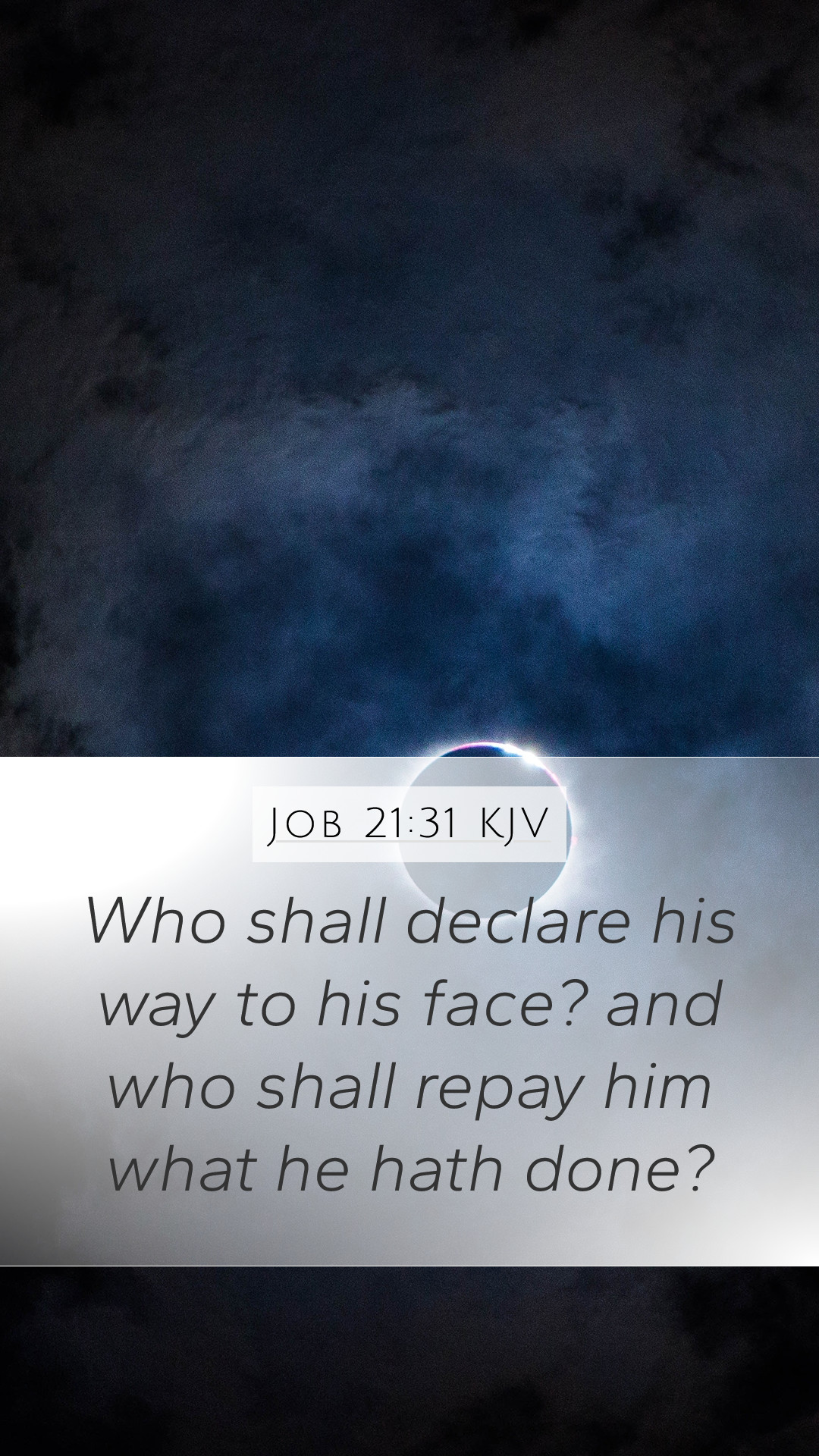Understanding Job 21:31
Job 21:31: "Who shall declare his way to his face? and who shall repay him what he hath done?"
Job 21:31 presents a profound question regarding divine justice and the accountability of mankind before God. This verse speaks to the idea of who can confront God about His ways and the consequences of human actions. Below is a synthesis of biblical commentary insights into this verse.
Bible Verse Meanings
As Job argues against the assumptions of his friends regarding divine retribution, he emphasizes the apparent prosperity of the wicked. His rhetorical questions suggest that people often cannot interrogate God regarding His judgments and the apparent exceptions to the principle of reaping what one sows. This struggle to understand divine justice remains relevant across the ages.
Bible Verse Interpretations
Albert Barnes notes that Job perceives a disconnect between the actions of the wicked and the judgment they should face. He points out how the wicked often seem to thrive, which raises profound questions about the validity of traditional views on retribution.
Matthew Henry emphasizes that Job here asserts that no one dares to challenge God directly or demand accountability, showcasing the reverence and fear intrinsic to humanity’s relationship with God. Job reflects on his desire to understand the justice of God even amidst his suffering.
Adam Clarke further elaborates that the question posed by Job challenges the belief that humans can fully comprehend or dictate the divine will and its administration. This theme of divine inscrutability resonates deeply in the biblical text.
Bible Verse Understanding
- Divine Supremacy: The verse underscores the sovereignty of God and the limitations of human understanding and authority.
- Moral Accountability: It presents the idea that even when evil seems to prosper, ultimate justice lies beyond human knowledge.
- Faith amidst Doubt: Job's plight is a reflection of the struggle to maintain faith in God's goodness in the face of suffering and injustice.
Bible Verse Explanations
This verse serves as a cornerstone for examining the theme of suffering and justice in the Book of Job. Job’s assertions challenge the simplistic formula of retribution theology, which suggests that good is always rewarded and evil punished in this life. As the dialogue progresses, Job invites readers to explore deeper theological questions concerning human suffering and divine oversight.
Bible Verse Commentary
Commentators reveal that Job’s questions point towards a greater philosophical inquiry into the nature of God. The inability to confront God implicates a call for humility and trust in God’s mysterious ways. The verse encapsulates a powerful human confrontation with suffering and faith.
Scripture Analysis
The implications of Job 21:31 extend to the modern day, prompting believers to grapple with their understanding of justice and faith. Through Job’s inquiry, readers are encouraged to explore their own struggles with divine justice and to seek solace in scriptures that elucidate God’s nature.
In-Depth Bible Verse Analysis
Job's rhetorical stance serves as an acknowledgment of humanity's limitations in perceiving God's ways. His questions remain rhetorical, highlighting the inability of mankind to demand clarity from God. This acknowledgment taps into a rich tradition of grappling with theodicy—the question of why a good God permits evil.
Application of Bible Verses to Daily Life
This verse invites introspection into issues of justice, suffering, and divine authority. For many believers, it’s a call to trust in God’s plan despite the absence of immediate understanding. It challenges individuals in their faith journeys to maintain trust in God’s wisdom over human reasoning.
Cross References
- Ecclesiastes 8:14 – "There is a vanity which is done upon the earth; that there be just men, unto whom it happeneth according to the work of the wicked..."
- Psalms 73:3-5 – "For I was envious at the foolish, when I saw the prosperity of the wicked."
- Romans 9:20 – "Nay but, O man, who art thou that replyest against God?"
- Job 10:2-3 – "I will say unto God, Do not condemn me; show me wherefore thou contendest with me."
- Habakkuk 1:13 – "Thou art of purer eyes than to behold evil, and canst not look on iniquity..."
In conclusion, Job 21:31 provides a multifaceted reflection on the nature of God, justice, and human suffering. It serves as a profound reminder for all those seeking Bible verse meanings, Bible verse interpretations, and rich Bible study insights. Through careful Bible study guides and discussions in Bible study groups, individuals can further navigate the complexities presented in this verse and related scriptures.


